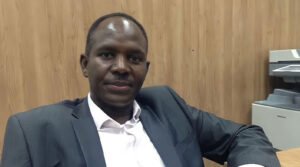Four Issues on the Sudanese Dialogue Table in Addis Ababa

Mohamed Zakaria: The Egyptian Initiative Has Achieved a Breakthrough, and the African Union Must Accompany the Egyptian Side
Cairo – Addis Ababa – Sudanhorizon
Source: Almohagig – Sabah Musa
Dr. Mohamed Zakaria, Deputy Secretary-General of the Justice and Equality Movement and official spokesman for the Democratic Bloc, explained that the Addis Ababa meetings being held these days witnessed a diverse Sudanese presence and that they focused mainly on four topics.
Zakaria said in exclusive statements to the “Almohagig” and “Sudanhorizon” websites, that these topics are the issues that are required to be discussed during the dialogue stage, the parties that must participate in this dialogue, the percentages of representation of these parties, and the management of the dialogue, including time and place.
Pointing out that agreement was reached on these issues after deep and transparent discussions, and that viewpoints differed on the issue of the parties that will participate.
Zakaria explained that when there was talk about the participation of the National Conference or not, we agreed that participation in the dialogue must be comprehensive, excluding only those who have been charged and convicted under Sudanese or even international criminal law, adding that this formula stipulated that this be in accordance with According to the constitutional document, this is one of the difficult points that was overcome after an in-depth dialogue.

Zakaria pointed out that the spirit that prevailed in the meetings was a spirit of compromise, and he said that the vision that was presented to the African Union, in addition to addressing these four issues, focused on confidence-building measures between the Sudanese and stakeholders, and building a conducive environment and climate for dialogue. He continued that in this part, it was proposed The need to pay attention to humanitarian issues, address the urgent needs of Sudanese refugees, as well as address the issue of delivering relief to those affected by the war, and other measures to bridge the gap between the Sudanese political parties so that they can sit at one table in the final dialogue stage, stressing that what distinguished these sessions was the spirit of compromise.
He said that these sessions come in the wake of the Cairo meetings that brought together the civil and political parties and that these meetings had a role in bringing viewpoints closer together and breaking the barrier between disparate civil groups, calling on the African Union to pay attention to communicating with the Egyptian initiative that profoundly addresses the Sudanese crisis. And coordination in this framework to unify efforts and achieve successes that contribute to ending the suffering of the Sudanese people. He also called on the African Union to intensify its efforts and contacts with international powers.
Zakaria noted that the Cairo meetings witnessed a remarkable and large international and diplomatic presence, unlike what is happening now in Addis Ababa, adding that the presence of the international community and the regional neighborhood as a facilitator in the dialogue process, and as a facilitator is necessary and necessary for the success of the dialogue, and to meet its outcomes, especially those related to relief and humanitarian aid and the reconstruction and reconstruction of what was destroyed by the war. Stressing the need to unify efforts and accompany the Egyptian side in the Sudanese issue, stressing that the Egyptian initiative achieved a breakthrough by bringing the two parties together, contrary to what currently exists in the African initiative.
Zakaria pointed out that the refusal of the Coordination of Civil Democratic Forces to participate in these meetings is not consistent with the complexities of the Sudanese scene, and he said that the position of Taqaddum who refuses to participate does not resemble the forces that believe in democratic transformation and the values of dialogue, stressing the importance of all Sudanese sitting at the dialogue table to resolve the crisis in their country.
The first phase of the political dialogue between the Sudanese parties, organized by the High-Level African Mechanism, was launched in the Ethiopian capital, Addis Ababa, on the 10th of July, and will continue until tomorrow, on Monday, at a time when several political and armed forces apologized for participating, led by the movements of Al-Hilu and Abdel Wahed Nour.
Shortlink: https://sudanhorizon.com/?p=327

